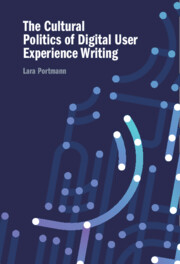Refine search
Actions for selected content:
2 results
1 - The Production, Pragmatics, and Politics of Digital Media
- from Introduction
-
- Book:
- The Cultural Politics of Digital User Experience Writing
- Published online:
- 24 July 2025
- Print publication:
- 07 August 2025, pp 3-26
-
- Chapter
-
- You have access
- HTML
- Export citation

The Cultural Politics of Digital User Experience Writing
-
- Published online:
- 24 July 2025
- Print publication:
- 07 August 2025
